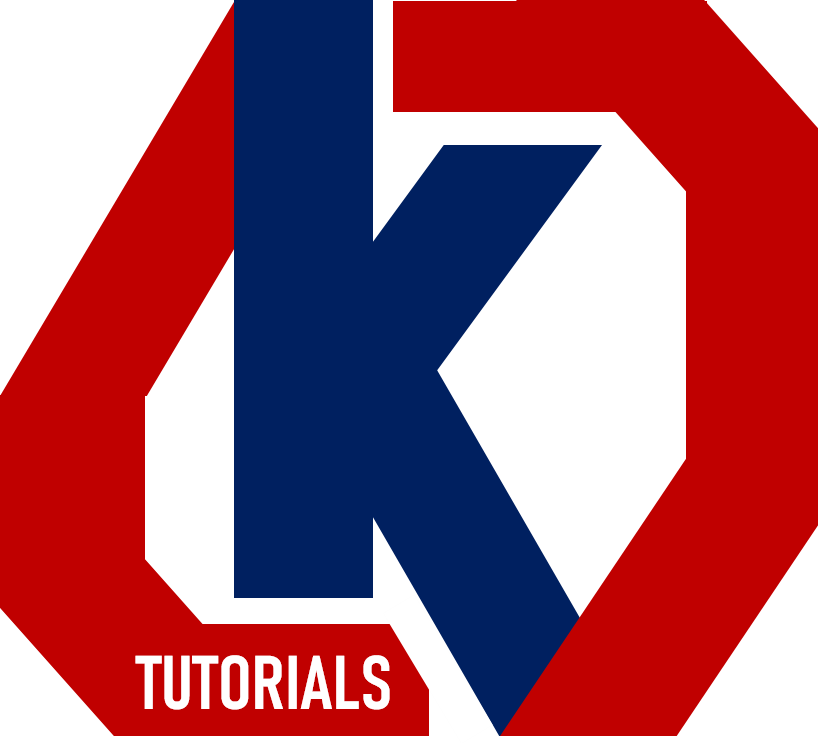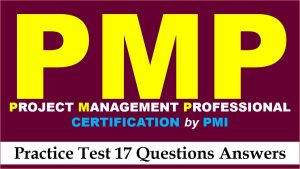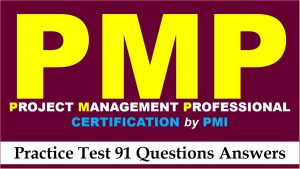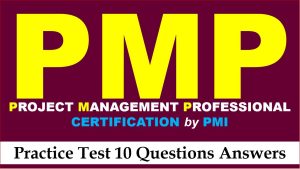Hi PMP aspirants, welcome to AKVTutorials. Are you actively preparing for the PMP exam and want practice questions that align with the agile mindset and principles? Embrace the agile mindset with our PMP Project Management Professional practice questions, aligning your preparation with modern project management principles. In this article, you will get PMP Exam Questions Practice Mock Test 33 Answers Keys. PMP (Project Management Professional) is a certification offered by PMI (Project Management Institute) to get a skill managing the people, processes, and business priorities of professional projects. The PMP certification holders are called Project Manager who have proven they have project leadership experience and expertise in any way of working.
PMP Exam Practice Questions
PMP Practice Test Question No 1
Which concept of locating team members can help them best to enhance their performance as a team?
Option A : Colocation
Option B : Cross-functional dispersion
Option C : Virtual e-teams
Option D : Global team dispersion
Show/Hide Answer
Answer Keys: YES
Explanation: No
Correct Answer: A
Colocation
PMP Mock Test Question No 2
In a lawsuit between your organization and a project contractor, the term “Constructive change” is discussed. Which statements on constructive changes are true?
Option A : Constructive changes are contract changes which are construed from actions taken by either party, not from a change document.
Option B : Changes in projects under contract are called constructive changes if they yield benefits for both parties.
Option C : Constructive changes are a frequent cause of disputes and claims of one contract party against the other.
Option D : Field changes should be meticulously documented to avoid an interpretation as constructive change.
Option E : Constructive change is a term used civil engineers for claims based on billable changes in building projects.
Show/Hide Answer
Answer Keys: YES
Explanation: No
Correct Answer: A, C , D
Constructive changes are contract changes which are construed from actions taken by either party, not from a change document., Constructive changes are a frequent cause of disputes and claims of one contract party against the other., Field changes should be meticulously documented to avoid an interpretation as constructive change.
PMP Practice Exam Question No 3
You are assigned as a project manager for an internal project. During cost planning and budgeting you discovered that there are peak times of costs during the project and other times when costs are fairly low. What could this mean for the project?
Option A : The fiscal budget mechanism which is used by the performing organization may not allow for cost peaks in your project, and you may have to level out expenditures over time.
Option B : You can silently create budget contingencies during low-cost periods and re-use them later during those periods when you have to cover peak levels in project costs.
Option C : You may find another project manager with a project that has a different rhythm of high and low costs. Then, you may be able to move budget during one project’s low cost periods to the other project.
Option D : You are a project manager and work with a lifecycle budget for your project. Fiscal budgets are a matter of the functional organization, and you generally do not have to care about them.
Show/Hide Answer
Answer Keys: YES
Explanation: No
Correct Answer: A
The fiscal budget mechanism which is used by the performing organization may not allow for cost peaks in your project, and you may have to level out expenditures over time.
PMP Mock Exam Question No 4
You are going to take over a new project as the project manager in an enterprise unknown to you. What should you investigate during the chartering process?
Option A : Enterprise environmental factors
Option B : Project management plan
Option C : Project risk register
Option D : Team performance reports
Show/Hide Answer
Answer Keys: YES
Explanation: No
Correct Answer: A
Enterprise environmental factors
Project Management Professional Question No 5
An organization is considering various contract types in order to motivate sellers and to ensure preferential treatment. What should they consider before deciding to use an award fee contract?
Option A : Payment of an award fee would be linked to the achievement of objective performance criteria.
Option B : Any unresolved dispute over the payment of an award fee would be subject to remedy in court.
Option C : Payment of an award fee would be agreed upon by both the customer and the contractor.
Option D : Payment of an award fee is decided upon by the customer based on the degree of satisfaction.
Show/Hide Answer
Answer Keys: YES
Explanation: No
Correct Answer: D
Payment of an award fee is decided upon by the customer based on the degree of satisfaction.
PMP Certification Prep Question No 6
What is least important when it comes to archiving project records? 76
Option A : A well-designed records management system
Option B : Integration of the archive with business software
Option C : Updated records reflecting final results
Option D : Easy availability of information for future use
Show/Hide Answer
Answer Keys: YES
Explanation: No
Correct Answer: B
Integration of the archive with business software
PMP Exam Question No 7
_______ are not necessarily used to establish the cost baseline of a project.77
Option A : Schedule activity or work package cost estimates.
Option B : The work breakdown structure and the WBS dictionary
Option C : The project schedule and the resource management plan
Option D : The risk breakdown structure and the risk report
Show/Hide Answer
Answer Keys: YES
Explanation: No
Correct Answer: D
The work breakdown structure and the WBS dictionary
PMP Exam Sample Question No 8
You took over a customer project for your company. From the inputs available, including contract, statement of work and project charter, you have developed a project management plan. You already presented that plan in a meeting with key stakeholders including your project sponsor and some representatives from the customer organization. During the meeting you sensed a high level of dissatisfaction by the customer executives, who signaled that the project might not produce the results that their company had expected. In your understanding, all necessary actions have been planned to meet the customer’s requirements. What should you do next?
Option A : Request a written statement from the customer detailing the requirements which they believe are not addressed by your plan. Use this statement to update the project plan.
Option B : Arrange meetings with the customer to identify their needs, wants and expectations for the project. Then create a narrative Scope statement from this information to document the agreed upon project scope.
Option C : Request a formal meeting on top executive level to get the misunderstandings sorted out, then arrange a change request, re-plan your project where necessary and go ahead with the project work.
Option D : Do not over-react. Performed according to your plan, the project will produce a convincing product for the customer. As soon as the executives will see it, they will probably change their opinion and accept it.
Show/Hide Answer
Answer Keys: YES
Explanation: No
Correct Answer: B
Arrange meetings with the customer to identify their needs, wants and expectations for the project. Then create a narrative Scope statement from this information to document the agreed upon project scope.
PMP Exam Practice Question No 9
What is not true for project deliverables?
Option A : Project deliverables should be identified, described and agreed upon as early in the project as possible.
Option B : Project deliverables may be products, capabilities for services or other kinds of results.
Option C : Once project deliverables have been identified, their description should not be changed any more.
Option D : The acceptance process for deliverables and how rejection will be addressed should be described in the contract
Show/Hide Answer
Answer Keys: YES
Explanation: No
Correct Answer: C
Once project deliverables have been identified, their description should not be changed any more.
PMP Certification Exam Question No 10
Your project, performed for a customer, is coming to an end. The customer has been contractually granted a three years warranty period for the product of the project. What should you do first?
Option A : Hand all relevant documentation over to the organizational unit responsible for handling the warranty.
Option B : There is no additional work to be done. The contract should describe all processes in sufficient detail.
Option C : Changes on the product can affect warranty clauses. Ensure that these clauses are aligned with the final specifications.
Option D : According to many legislations, you cannot formally close a project before the end of the warranty period.
Show/Hide Answer
Answer Keys: YES
Explanation: No
Correct Answer: C
Changes on the product can affect warranty clauses. Ensure that these clauses are aligned with the final specifications



